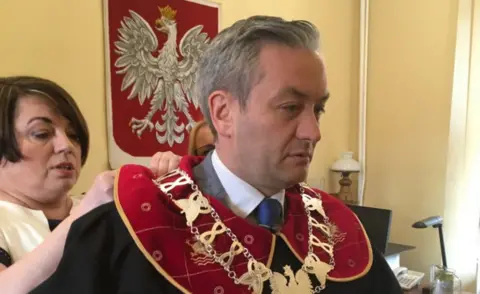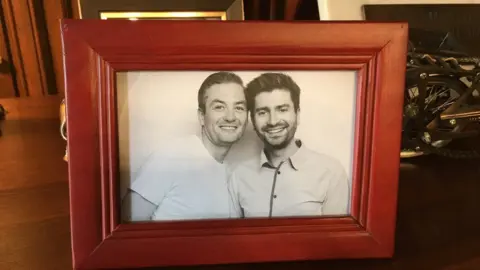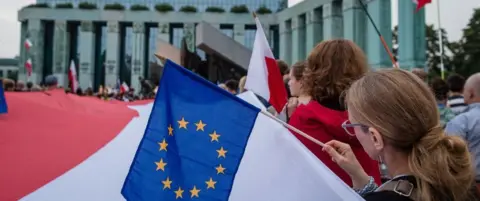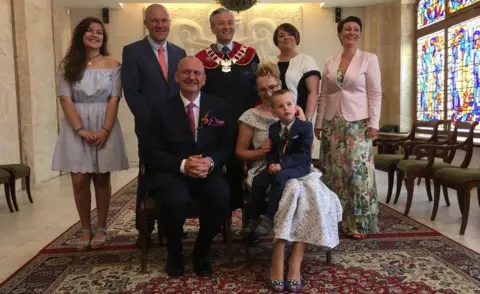The gay mayor shaking up politics in Catholic Poland
 BBC
BBCRobert Biedron is one of Poland's young, rising political stars. He's an atheist in perhaps Europe's most Catholic country and its only openly gay politician. And now he is being viewed as a frontrunner for Poland's presidency.
"I'm a dreamer. I was born in a very traditional, conservative part of Poland. I am gay and being an atheist, it wasn't easy for me," says Mr Biedron, mayor of Slupsk, a city about 18km (11 miles) from the country's Baltic Sea coast.
He is being talked about as one of the leaders of a new progressive political movement that is being organised.
A former Polish President, Aleksander Kwasniewski, has urged him to run for president in 2020. Opinion polls put him third behind the popular incumbent, Andrzej Duda, and the ex-prime minister and current European Council President, Donald Tusk.
'Beaten up on the street'
Robert Biedron has made his political career to date seem surprisingly easy. A left-wing former gay rights activist, the 42-year-old became Poland's first openly gay MP in 2011 and then Slupsk mayor in 2014.
"As an MP I was beaten up four or five times on the street," he says.
"Now, they are all smiling at me and greeting me." Several minutes later a man does exactly that. The mayor points out that a few years ago things would have been different.
"They would probably have said 'You faggot', or they would spit at me. Today, they say 'Good Morning Mr Mayor' and this is a sign of change."

Polish attitudes to homosexuality are evolving but gay marriage is still outlawed, unlike in many Western European countries. That's galling for Mr Biedron, who as mayor marries many couples.
"I'm extremely jealous because I see their happiness. I'm 15 years with my partner and it's still a dream. It's not fair that in 2018 two adults cannot get married if they love each other and are committed to each other," he said.
Conservatives in charge
Poland is governed by the conservative Law and Justice (PiS) party, which in 2015 became the first party since communism ended in 1989 to win an outright majority. And for the first time no left-wing party got into parliament.
PiS won on a platform of conservative, patriotic and Roman Catholic values, married to anti-elitism and state support in the form of increased child benefit, subsidised housing and free medicines for senior citizens.
 Getty Images
Getty ImagesSince then, the government has infuriated many liberal Poles by consolidating control over the public media, civil service and prosecutors.
Its reform of Poland's judiciary prompted the European Commission to launch an unprecedented rule of law investigation, amid concerns that democracy was becoming endangered. The measures hand the PiS-dominated parliament, the justice minister and the president more power over the selection of judges.
Read more on related topics:
Despite this, PiS easily remains Poland's most popular party. That is not the case in Slupsk, a city of more than 90,000 in north-western Poland.
"Poland is not only devoted to a conservative, populist, authoritarian political party," says Mr Biedron, who has taken a pay cut, reduced the city's debt by tens of millions of zlotys, boosted spending on education and social housing and is building a new theatre.
He has also taken a red sofa out onto the street to chat to constituents.

Is Poland ready for a gay leader?
His critics say he has no real programme and is mostly about PR stunts. Renata Kim, a journalist for the Polish edition of Newsweek, believes he may have difficulty extending his local popularity nationwide.
"I think it's too early for an openly gay politician to become an important figure in politics," she argues.
"We are a very conservative society. People are not ready to accept such a person as their president or prime minister," she adds.
He has however had an important impact on attitudes to homosexuality in Poland.
"I saw him speaking to young people at a music festival and he was just a hero, he was a star. They listened to him like they would listen to a prophet and this was for me a sign that homosexuality is becoming a normal thing in Poland."
